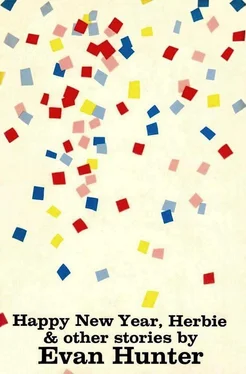“Bobby, I... I must go. He expects me.”
“No,” he said. “Listen to me. I want you. I still want you.”
“No.” She shook her head. “Please, no, no...”
“I love you, Lois. I didn’t realize just how much until I saw you again.”
“Bobby...”
“Tell me the truth! Were you really alive again? Were you really alive until you saw me again this afternoon, until we met?”
“No,” she admitted. “I wasn’t. I wasn’t really alive.”
“I won’t let you get away this time. This time I’ll keep you forever.”
“Keep?” she asked. “Forever?” And the words together had a hollow, futile ring to them. She raised her eyes to meet his. He smiled tentatively.
“We’re together again, darling,” he said. “Don’t you see?”
“And where... where does it lead this time?”
“Does it have to lead some place?” he asked. “Hell, we’ll let it lead wherever it wants to. How’s that? Anywhere! Everywhere!”
She watched the excitement on his face, and she said nothing.
“I’ve got the car in town,” he said, beginning to plot already. “It’ll take me a minute to get it. You can call him at the office, can’t you? Tell him you’ve been delayed. I’ll have you home by seven, the latest. You can call him, can’t you?”
“You know I can call him,” she said.
“What’ll you tell him? The trains? They were always good. A delay in Penn Station. How’s that?”
She studied him across the table, studied the immature mouth, and the glowing eyes, and the eager forward tilt of his body, studied all the things she had loved, all the things she had carried inside her, buried deep in her memory since the night he’d called to end it. She studied him, and she realized of course that he’d been absolutely right, she hadn’t been alive again, not really alive again until this meeting with him this afternoon. And it seemed to her now that this meeting had been a necessary thing, a part of the plot they’d once shared, something without which she would never have known really complete happiness ever again.
She sighed heavily and pushed back her chair, lifting her purse from the table.
“There’s a phone at the end of the bar,” he said, smiling.
“I saw it when we came in,” she answered.
“Hurry,” he said, his smile widening.
“No,” she answered.
“What?”
“I have a train to catch, Bobby. Thank you for everything.”
“What? But... but you admitted... you admitted you were alive again. You said—”
“I am,” she answered, and then, seeing his puzzlement, she touched his face gently and said, “Bobby, Bobby. Thank you, Bobby.”
She turned and left him at the table, and she heard the hollow click of her high heels as she walked out of the lounge and into the street.
The wind had grown stronger.
It made her eyes tear, but only until she grew accustomed to it.
They were telling the same tired jokes in the squadroom when Randolph came in with his prisoner.
Outside the grilled windows, October lay like a copper coin, and the sun struck only glancing blows at the pavement. The season had changed, but the jokes had not, and the climate inside the squadroom was one of stale cigarette smoke and male perspiration. For a tired moment, Randolph had the feeling that the room was suspended in time, unchanging, unmoving and that he would see the same faces and hear the same jokes until he was an old, old man.
He had led the girl up the precinct steps, past the hanging green globes, past the desk in the entrance corridor, nodding perfunctorily at the desk sergeant. He had walked beneath the white sign with its black-lettered DETECTIVE DIVISION and its pointing hand, and then had climbed the steps to the second floor of the building, never once looking back at the girl, knowing that in her terror and uncertainty she was following him. When he reached the slatted rail divider, which separated the corridor from the detective squadroom, he heard Burroughs telling his old joke, and perhaps it was the joke which caused him to turn harshly to the girl.
“Sit down,” he said. “On that bench!”
The girl winced at the sound of his voice. She was a thin girl wearing a straight skirt and a faded green cardigan. Her hair was a bleached blonde, the roots growing in brown. She had wide blue eyes, and they served as the focal point of an otherwise uninteresting face. She had slashed lipstick across her mouth in a wide, garish red smear. She flinched when Randolph spoke, and then she backed away from him and went to sit on the wooden bench in the corridor, opposite the men’s room.
Randolph glanced at her briefly, the way he would look at a bulletin board notice about the Policeman’s Ball. Then he pushed through the rail divider and walked directly to Burroughs’ desk.
“Any calls?” he asked.
“Oh, hi, Frank,” Burroughs said. “No calls. You’re interrupting a joke.”
“I’m sure it’s hilarious.”
“Well, I think it’s pretty funny,” Burroughs said defensively.
“I thought it was pretty funny, too,” Randolph said, “For the first hundred times.”
He stood over Burroughs’ desk, a tall man with close-cropped brown hair and lustreless brown eyes. His nose had been broken once in a street fight, and together with the hard, unyielding line of his mouth, it gave his face an over-all look of meanness. He knew he was intimidating Burroughs, but he didn’t much give a damn. He almost wished that Burroughs would really take offence and come out of the chair fighting. There was nothing he’d have liked better than to knock Burroughs on his ass.
“You don’t like the jokes, you don’t have to listen,” Burroughs said, but his voice lacked conviction.
“Thank you. I won’t.”
From a typewriter at the next desk Gene Fields looked up. Fields was a big cop with shrewd blue eyes and a friendly smile. The smile belied the fact that he could be the toughest cop in the precinct when he wanted to.
“What’s eating you, Frank?” he asked, smiling.
“Nothing. What’s eating you?”
Fields continued smiling. “You looking for a fight?” he asked.
Randolph studied him. He had seen Fields in action, and he was not particularly anxious to provoke him. He wanted to smile back and say something like, “Ah, the hell with it. I’m just down in the dumps” — anything to let Fields know he had no real quarrel with him. But something else inside him took over, something that had not been a part of him long ago.
He held Fields’ eyes with his own. “Any time you’re ready for one,” he said, and there was no smile on his mouth.
“He’s got the crud,” Fields said. “Every month or so, the bulls in this precinct get the crud. It’s from dealing with criminal types.”
He recognized Fields’ manoeuvre and was grateful for it. Fields was smoothing it over. Fields didn’t want trouble, and so he was joking his way out of it now, handling it as it should have been handled. But whereas he realized Fields was being the bigger of the two men, he was still immensely satisfied that he had not backed down. Yet his satisfaction rankled.
“I’ll give you some advice,” Fields said. “You want some advice, Frank? Free?”
“Go ahead,” Randolph said.
“Don’t let it get you. The trouble with being a cop in a precinct like this one is that you begin to imagine everybody in the world is crooked. That just ain’t so.”
“No, huh?”
“Believe me, Frank, it ain’t.”
“Thanks,” Randolph said. “I’ve been a cop in this precinct for eight years now. I don’t need advice on how to be a cop in this precinct.”
“I’m not giving you that kind of advice. I’m telling you how to be a man when you leave this precinct.”
Читать дальше












